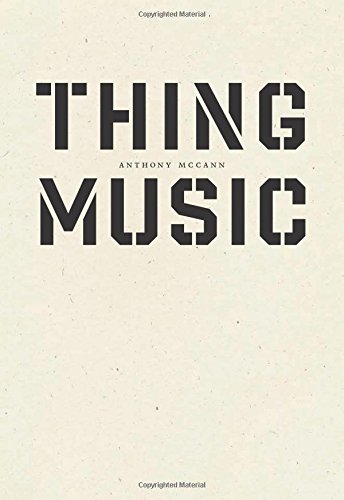Thing Music
“The Day,” the first poem Anthony McCann’s latest poetry collection, Thing Music, from Wave Books, begins:
In this coupling
of speech
where everything
begins where
shimmering
began
please put on my voice
and through
this voice
my eyes A lot of the collection’s key elements are present on the very first page. The lines disorient before they orient, delivering sentences snippet by snippet. Verb tenses shift within the same thought, and synesthesia-like juxtapositions make appeals to mismatched senses. Thing Music has an occasional, fragmentary feel, and continues the kind of loosening of narrative that McCann seems to have been working toward since his 2006 publication Moongarden. Individual lines orphan nouns and dependent clauses, leaving bits that, at first glance, confuse the eye and, counter-intuitively, require the reader to slow down to parse. McCann is preoccupied here—and in his work in general—with the gaps between sight and thought, with how people perceive things. McCann’s work invites readers to adopt his speaker’s voice, “and through/this voice/my eyes.”
A side effect of fragmented syntax is that it’s rarer in these poems for the language to function poetically at the level of the individual line. Many of the loveliest stanzas in the book can’t be broken down further, as is evident in those first lines of “The Day,” or in the last stanza of “Like the Dirt (5 Ceremonies)”:
Secretly
we ate
the paintings
of each place
The syntax enhances the feeling of casual disjointedness the poems’ content evokes, and some of them even borrow language from elsewhere: “This Living Hand,” “The Selected,” and others in the collection make use of lines from letters and poems from Yeats and Ashbery.
Although the tone is open overall—this is backed up visually by ample white space—there are moments when the abstractions become just a bit menacing. Society, urbanity, and its technological trappings are untrustworthy; there’s always a hint of unrest when the poems invoke the city. These tensions keep the book’s more pastoral impulses in check, and even writing itself is an ambivalent act here: “Words have better things to do than count on us to see them,” McCann states, “they know when we aren’t there.”
Thing Music is not creating an idyll as much as it is reflecting the world in the only way we can possibly know it, seen incompletely and understood imperfectly. The flaws in our ability to perceive are, after all, a compelling reason why we need poetry in the first place.





